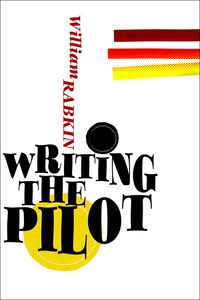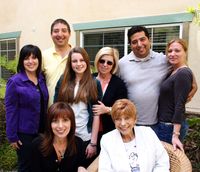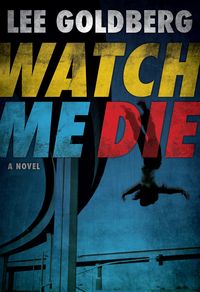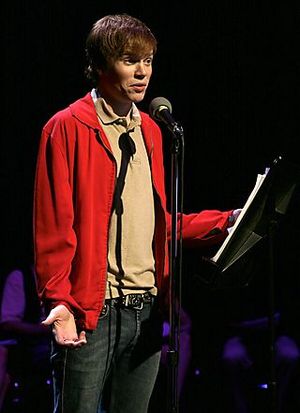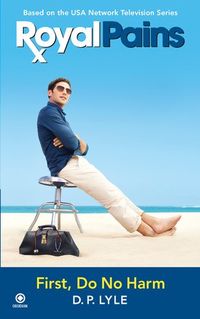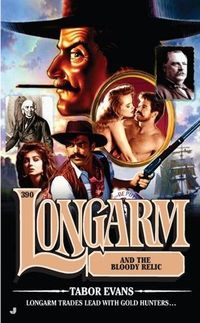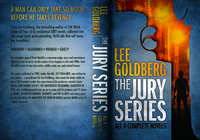 Over the last couple of weeks, I've had the opportunity to stick my big, one-hour drama toe into the sitcom world, courtesy of a friend of mine who is writing & producing a pilot for a major network. Much to my surprise, he invited me to the studio one afternoon a few weeks back to participate in the initial punch-up of the script…along with a roomful of Emmy-award winning, comedy legends, like my friend Ken Levine and his partner David Isaacs. I figured I'd just sit in the corner, keep my mouth shut, and watch the masters at work.
Over the last couple of weeks, I've had the opportunity to stick my big, one-hour drama toe into the sitcom world, courtesy of a friend of mine who is writing & producing a pilot for a major network. Much to my surprise, he invited me to the studio one afternoon a few weeks back to participate in the initial punch-up of the script…along with a roomful of Emmy-award winning, comedy legends, like my friend Ken Levine and his partner David Isaacs. I figured I'd just sit in the corner, keep my mouth shut, and watch the masters at work.
But like the lead character in the pilot, sometimes my mouth and my brain don't always work in concert. I was only there for a few minutes when I contributed a joke…which went over only slightly better than if I'd vomited on the table. I decided to keep my mouth shut. That resolve lasted perhaps five more minutes, when once again I heard myself suggesting a joke…which went over so badly, I expected security to be called to escort me out of the studio.
I know I can be funny…when I am sitting at the computer, by myself, writing. And I know I can be amusing on panels or when speaking in public. But I'd never had to be funny on-demand, to contribute specific jokes to serve a plot point or character beat.
Who the hell was I to think that I could participate? I decided I was going to just shut up, listen, and learn. But then, the more I listened, I realized that everybody was offering stinkers as well as winners…for every ten bad jokes someone threw out, perhaps one would stick. And before I knew it, I was throwing another joke into the mix…and to my shock, everyone laughed and my buddy put it in the script.
I was ridiculously pleased and my reluctance to participate evaporated. I stopped feeling so self-conscious about my horrible jokes and did what everyone else was doing — sharing whatever came to mind. And to my delight, a couple more of my jokes got laughs…and found their way into the script in some form or another.
I ended up having a wonderful time and learning how a comedy writers room differed from the "drama" rooms I'd been part of for most of my career. 
The closest I've ever come to something approximating the punch-up experience was writing for MONK. Andy Breckman and his writing staff all came from SNL or Letterman or stand-up, not the episodic world, so they were always throwing out jokes…but we were still writing a mystery, and the room, and the plotting, felt comfortable and familiar to me. I knew I could do the job and I didn't feel any pressure to be funny. I was more likely to offer a funny situation to the room than a joke, per se.
But in the punch-up room, story structure wasn't the main issue. It was making the funny stuff funnier…creating new jokes to address specific problems. I've re-written scripts before…and made funny scenes funnier…but never on-demand in front of a room of other writers. Rewriting has always been a private affair.
But one thing the punch-up experience shared in common with all of my other writing room experiences was that brainstorming was encouraged, that even bad ideas were welcomed because they could lead to good ones. In that respect, throwing out jokes was no different than suggesting clues, plot points, character beats, or any other aspect of writing a drama.
It was a great day…it was an honor and a thrill just to be in the room with all of those extremely talented and acclaimed writers… to see how their minds worked…and how they worked with others.
The last thing I expected was to be invited back.
But I was.
The pilot has now been cast, a major director has been signed, the sets have been built, and it will be shot this week. Today I was invited back to help punch up the script following the final run-through.
This, too, was an entirely new experience for me. An entirely different group of comedy writers were gathered this time to watch the show on its feet, to see what worked and what didn't, then help the showrunner tweak the script to address network notes and smooth out some last-minute bumps that emerged during the staging.
So that's what we did. We watched a full run-through of the show, then locked ourselves in a conference room with a deli platter, soft drinks, a stack of scripts and lots of pencils. It was a lot like my previous experience…only scarier, because two top-level studio execs would be sitting in on the punch-up. I had no idea what I was supposed to do, what the rules were, or how this was supposed to work. But I knew if I made a fool of myself, the studio execs would certainly remember.
My friend, the showrunner, went through the script scene-by-scene, telling us what the problems were that had to be addressed and asking the writers in the room, all good friends of his, for their thoughts on any other bumps he might have missed.
People threw out new jokes and, once again, I hesitantly offered one of my own…that clearly nobody liked. It was as if I'd dropped my pants and urinated in the middle of the room. Well, at least that's how it felt to me.
More jokes flew around. I hesitantly offered another one, also D.O.A. I was a fraud, a witless moron who had no place in a room full of professional comedy writers… so I tossed out one last joke to confirm what I already knew about my failings.
Everyone laughed. And then they took that joke and started improving on it. So I added a tweak of my own. The joke went in to the script.
There was a young writer in the room who was absolutely fearless. Or perhaps "shameless" is the better word. He threw out one joke after another….dozens of them, most of them lousy, and just kept doing it until he hit on something hilarious… and if that wasn't the joke that went in, it led the room to the one that did.
I learned a valuable lesson from him — I realized my biggest problem was my hesitancy. I had to commit to my jokes, or go in the opposite direction, throw them out casually, without worrying about whether they were any good or not.
From that moment on, I contributed whatever came to my mind…and was surprised, and ridiculously pleased, by how much of my stuff either made it in, or inspired someone else in the room to come up with something much, much better than what I'd offered, but along the same lines. We began to work as a big team, backing each other up. It was great fun.
I have no illusions about being any good at this, or that I came close to holding my own with the far more talented people in the room, but I had a great time…it actually felt good to be scared, to be challenged in new ways, to discover new strengths as well as new weaknesses about myself.
This experience is going to make me a better writer…and for that, I owe my comedy-writing friend a big thank-you for taking a chance and inviting me into the room.
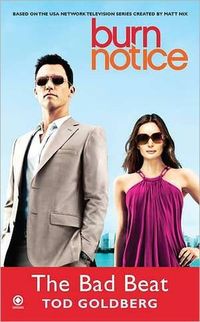 After writing five BURN NOTICE books, my brother Tod has called it quits, turning down a contract for more. Remarkably, the publisher has decided to retire the series as a result. Now that THE BAD BEAT, his final book in the series is coming out, Tod reflects on his blog today on what he's learned from the experience. Here's an excerpt:
After writing five BURN NOTICE books, my brother Tod has called it quits, turning down a contract for more. Remarkably, the publisher has decided to retire the series as a result. Now that THE BAD BEAT, his final book in the series is coming out, Tod reflects on his blog today on what he's learned from the experience. Here's an excerpt:
